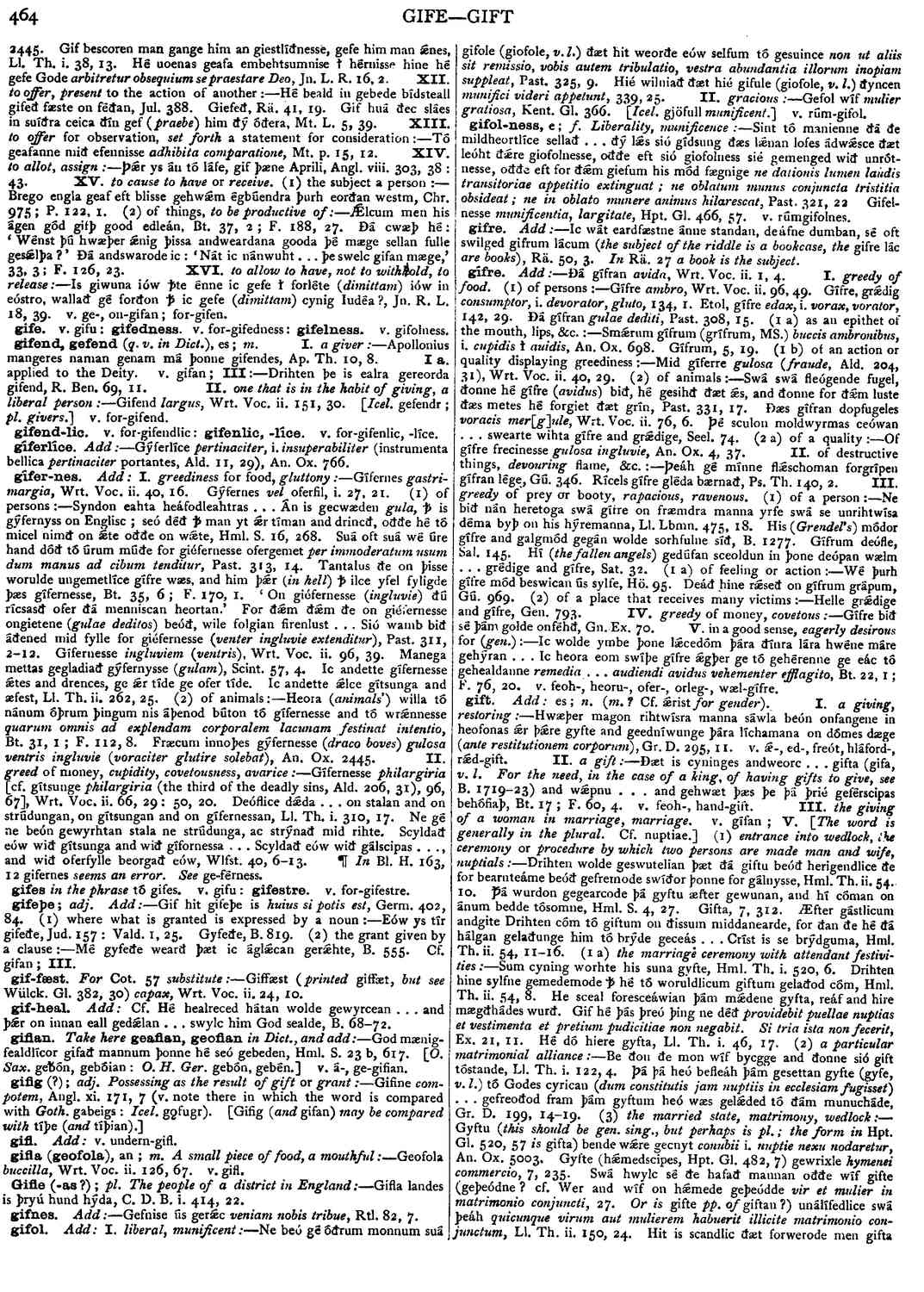gift
- noun [ masculineneuter ]
- verb
- participle
-
Hwæþer magon rihtwísra manna sáwla beón onfangene in heofonas ǽr þǽre gyfte and geedníwunge þára líchamana on dómes dæge (
ante restitutionem corporum
),- Gr. D. 295, ii. v. æ-, ed-, freót, hláford-, rǽd-gift.
-
-Ðæt is cyninges andweorc . . . gifta (gifa,
v. l. For the need, in the case of a king, of having gifts to give, see
- B. 1719-23) and wǽpnu . . .
- Drihten wolde geswutelian þæt ðá giftu beóð herigendlice ðe for bearnteáme beóð gefremode swíðor þonne for gálnysse. Hml. Th. ii. 54. 10. ꝥá wurdon gegearcode þá gyftu æfter gewunan, and hí cóman on ánum bedde tósomne. Hml. S. 4, 27.
-
Gifta,
- 7, 312.
-
Æfter gástlicum andgite Drihten cóm tó giftum on ðissum middanearde, for ðan ðe hé dá hálgan gelaðunge him tó brýde geceás . . . Críst is se brýdguma, Hml. Th. ii. 54, 11-16. (I a)
the marriage ceremony with attendant festivi-ties
:-- Sum cyning worhte his suna gyfte,- Hml. Th. i. 520, 6.
-
Drihten hine sylfne gemedemode ꝥ hé tó woruldlicum giftum gelaðod cóm,
- Hml. Th. ii. 54, 8.
-
He sceal foresceáwian þám mǽdene gyfta, reáf and hire mægðhádes wurð. Gif hé þás þreó þing ne déð
providebit puellae nuptias et vestimenta et pretium pudicitiae non negabit. Si tria ista non fecerit
,- Ex. 21, II. Hé dó hiere gyfta, Ll. Th. i. 46, 17.
- Be ðon ðe mon wíf bycgge and ðonne sió gift tóstande. Ll. Th. i. 122, 4.
-
Þá þá heó befleáh þám gesettan gyfte (gyfe,
v. l.) tó Godes cyrican (dum constitutis jam nuptiis in ecclesiam fugisset )
. . . gefreoðod fram þám gyftum heó wæs gelǽded tó ðám munucháde.- Gr. D. 199, 14-19.
-
Gyftu
(this should be gen. sing., but perhaps is pl.; the form in Hpt. Gl. 520, 57 is gifta) bende wǽre gecnyt conubii i. nuptie nexu nodaretur
,- An. Ox. 5003.
-
Gyfte (hǽmedscipes. Hpt. Gl. 482, 7) gewrixle
hymenei commercio
,- 7, 235.
-
Swá hwylc sé ðe hafað manual, oððe wíf gifte (geþeódne ? cf. Wer and wíf on hǽmede geþeódde vir et mulier in matrimonio conjuncti. 27. Or is gifte pp. of giftan?) unálífedlice swá þeáh
quicunque virum aut mulierem habuerit illicite matrimonio con-junctum
,- Ll. Th. ii. 150, 24.
- Hit is scandlic ðæt forwerode men giftawilnian, ðonne gifta ne sind gesette for nánum ðinge búton for bearn-teáme. Hml. Th. ii. 94, 12.
- Heáp mægdhádes manna on clǽnnysse þurh-wunigende forlǽtenum giftum, i. 546, 23.
-
Tó gyftum
ad (thalami) tedas
.- An. Ox. 2, 199.
- Gyftu, 3377.
-
Gyfta, hǽmeda
hymeneos
, 1781 :- Wrt. Voc. ii. 43, 13.
Bosworth, Joseph. “gift.” In An Anglo-Saxon Dictionary Online, edited by Thomas Northcote Toller, Christ Sean, and Ondřej Tichy. Prague: Faculty of Arts, Charles University, 2014. https://bosworthtoller.com/50725.
Checked: 0